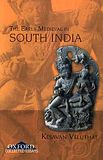The Early Medieval in South India
Veluthat, Kesavan:
The early Medieval in South India / by Kesavan Veluthat. - New Delhi : Oxford University Press, 2009. - xii, 356 S.
ISBN 978-0-19-569663-9 / 0-19-569663-8
Rs. 695,00
US$ 15,11 (Eastern Book Corp.)
Beschreibung
Written over two decades, this distinctive collection explores— for the first time— the notion of 'early medieval' in south India. Presenting an alternative history of the deep south, Kesavan Veluthat re-examines the problems and patterns in the history of Tamilakam in general and early medieval Kerala and Karnataka in particular.
Was there an 'early medieval' distinct from the preceding early historical formations in south India? What were the processes involved in this transition? Is it possible to explain the processes and structures characterizing the early medieval period? In this context, the volume investigates areas like role of temples and corporate bodies, structure of land-rights, patterns of surplus extraction, nature of state, evolution of landlordism, and the emergence of regional identity. [Verlagsinformation]
Inhalt
Preface. ix
Acknowledgements. xi
Introduction. 1
PART I: TAMILAKAM
1. Into the 'Medieval'-and out of It. 19
2. The Temple in Medieval South India. 61
3. Land Rights and Social Stratification. 83
4. Labour Rent and Produce Rent. 100
5. Nadu in the Socio-political Structure. 109
PART II: MEDIEVAL KERALA
6. The Keralolpatti as History. 129
7. Epigraphy in the Historiography of Kerala. 147
8. Literacy and Communication in Pre-modern Kerala. 168
9. The King as Lord and Overlord. 183
10. A Capital City as a Sacred Centre. 229
11. Medieval Kerala: State and Society. 249
12. Landlordism in Medieval Kerala. 277
13. Evolution of a Regional Identity. 295
PART III: IN THE NEIGHBOURHOOD: EARLY MEDIEVAL KARNATAKA
14. Velevali in Karnataka. 315
15. Landed Magnates as State Agents. 325
Index. 333
Autor
KESAVAN VELUTHAT, Professor and Chairman, Department of History, Mangalore University. He has served as Joint Secretary (1991–3) and Sectional President of the Indian History Congress (1997) and has held visiting professorships at École Pratique des Hautes Etudes, Paris (1999) and Maison des Sciences des L’Hommes, Paris (2003, 2006).
Quellen: Oxford University Press (India); Vedams Books; Eastern Book Corp.; Exotic India; WorldCat.
Ähnlich
- Biedermann: The Portuguese in Sri Lanka and South India
- Francis: Le discours royal dans l'Inde du Sud ancienne 1
- South India under the Cholas
- Llewellyn-Jones: Last King in India
- After Timur Left
- Sohi: Echoes of Mutiny
- Fischer-Tiné: Shyamji Krishnavarma
- Soldat Ram Singh und der Kaiser
- India and Europe in the Global Eighteenth Century
- Cederlöf: Founding an Empire on India's North-Eastern Frontiers

